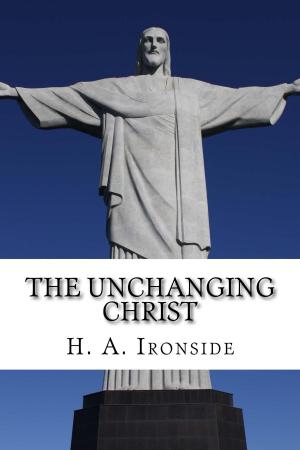The Natural History of Sacred Books
Nonfiction, Religion & Spirituality, Christianity, Christian Literature| Author: | Allan Menzies | ISBN: | 1230001944969 |
| Publisher: | CrossReach Publications | Publication: | September 30, 2017 |
| Imprint: | Language: | English |
| Author: | Allan Menzies |
| ISBN: | 1230001944969 |
| Publisher: | CrossReach Publications |
| Publication: | September 30, 2017 |
| Imprint: | |
| Language: | English |
The study of comparative religion is destined to exercise a profound influence on every branch of Christian theology. We are coming to see that many of the cherished doctrines of our own religion are not peculiar to Christianity, but have their parallels in other faiths. This must in time lead us to form new estimates of them and to recognize in our own beliefs not only the result of a special revelation to ourselves, but the outcome of forces and tendencies of human nature which have been at work in many lands. The Christian student must more and more be led to admit that he cannot fully understand a doctrine in his own religion till he has studied the parallel instances in which it is found, and has tried to trace the root in human nature which has produced the same or similar fruits in different races and in far separate climes. To take an example, the teacher of Christian theology will come to treat the Christian doctrine of a future life in connection with the Chinese worship of ancestors and the belief of the old Egyptians as to the journey which awaited them through the dark underworld, with the Elysian plains of Greece and the Valhalla of the Norsemen, as well as with the Buddhist Nirvana. In setting forth the essential nature of Christian worship, he will discuss the instinct which prompted the sacrifice of primitive times as well as those present in the elaborate rituals of India and of Greece and Rome. Thus theology will become a much broader study than it has been apt to prove; it will ally itself with more various learning, and it will grow more universal, more humane, and will interest many more minds. Nor in this wider study of theology is there any danger, rather is there the strongest possible safeguard, to what is deepest and most substantial in our own most dear religion. When we find that a doctrine which we hold is common to us with men of other faiths, we have discovered an additional evidence of its truth and value. If Christianity should prove to possess many such doctrines, it will not be the less but the more entitled on that account to be considered the consummation of all the religions of the world, the goal which they have all been seeking, the attainment in which all who have hitherto adhered to them may be called to receive their share.
In what way may these remarks be applied to the doctrine of sacred Scripture which we hold? There is no need to insist on the importance of a trustworthy foundation for this doctrine. To the Christian it is a matter of no slight moment to be assured that the books of Scripture occupy the place they hold by a good warrant and that no mistake of great importance has been made regarding them; and the heathen also who are invited to accept Christianity may reasonably ask for evidence of this. The Bible, it is well known, is not the only collection of sacred writings; other religions also have their bibles and have claimed for them divine inspiration. And it is becoming more and more difficult, both on historical and on moral grounds, to maintain the old position that the doctrine of divine inspiration is true in the one case of the Christian Scriptures and false in all the other cases in which it is made. The problem stands as follows:
A number of religions possess among their sacred treasures collections of written works which are held to have come into the world in a different way from that in which books are commonly produced.
The study of comparative religion is destined to exercise a profound influence on every branch of Christian theology. We are coming to see that many of the cherished doctrines of our own religion are not peculiar to Christianity, but have their parallels in other faiths. This must in time lead us to form new estimates of them and to recognize in our own beliefs not only the result of a special revelation to ourselves, but the outcome of forces and tendencies of human nature which have been at work in many lands. The Christian student must more and more be led to admit that he cannot fully understand a doctrine in his own religion till he has studied the parallel instances in which it is found, and has tried to trace the root in human nature which has produced the same or similar fruits in different races and in far separate climes. To take an example, the teacher of Christian theology will come to treat the Christian doctrine of a future life in connection with the Chinese worship of ancestors and the belief of the old Egyptians as to the journey which awaited them through the dark underworld, with the Elysian plains of Greece and the Valhalla of the Norsemen, as well as with the Buddhist Nirvana. In setting forth the essential nature of Christian worship, he will discuss the instinct which prompted the sacrifice of primitive times as well as those present in the elaborate rituals of India and of Greece and Rome. Thus theology will become a much broader study than it has been apt to prove; it will ally itself with more various learning, and it will grow more universal, more humane, and will interest many more minds. Nor in this wider study of theology is there any danger, rather is there the strongest possible safeguard, to what is deepest and most substantial in our own most dear religion. When we find that a doctrine which we hold is common to us with men of other faiths, we have discovered an additional evidence of its truth and value. If Christianity should prove to possess many such doctrines, it will not be the less but the more entitled on that account to be considered the consummation of all the religions of the world, the goal which they have all been seeking, the attainment in which all who have hitherto adhered to them may be called to receive their share.
In what way may these remarks be applied to the doctrine of sacred Scripture which we hold? There is no need to insist on the importance of a trustworthy foundation for this doctrine. To the Christian it is a matter of no slight moment to be assured that the books of Scripture occupy the place they hold by a good warrant and that no mistake of great importance has been made regarding them; and the heathen also who are invited to accept Christianity may reasonably ask for evidence of this. The Bible, it is well known, is not the only collection of sacred writings; other religions also have their bibles and have claimed for them divine inspiration. And it is becoming more and more difficult, both on historical and on moral grounds, to maintain the old position that the doctrine of divine inspiration is true in the one case of the Christian Scriptures and false in all the other cases in which it is made. The problem stands as follows:
A number of religions possess among their sacred treasures collections of written works which are held to have come into the world in a different way from that in which books are commonly produced.















